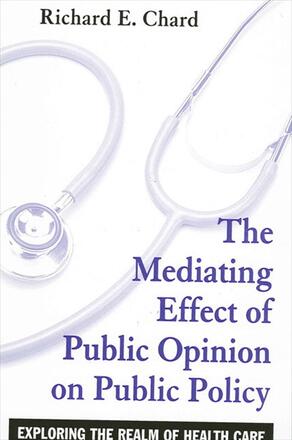Acknowledgments
1. Health Policy Change
Why Has Health Care Dominated the Policy Agenda?
Explanations from Social Science
Overview
2. Exploring the Foundations of Dynamic Policy Change
Path Dependence
The Importance of Public Opinion in Shaping Health Care Policy
American Health Care Policy
The Dynamic Nature of Health Care Reform?
Incrementalism versus Dynamism in Health Care
3. Path Dependence and Policy Change
Introduction
Social Constructions and Medicare
How the Elderly Lost and Regained Their Health Insurance
Analyzing Change
Does the Mood Really Matter?
Conclusion
4. Presidents as Advocates, Entrepreneurs, and Agenda Setters
Introduction
Presidents as Advocates and Entrepreneurs
Policy Change Research
The Presidents and Their Policies
Data and Methods
Results
Discussion
Conclusion
5. Healthy,Wealthy, and Wise?
Introduction
Theories of Information
The Failure of the Health Security Act
Information and Policy Support
Measuring and Testing Knowledge
A Model of Reciprocal Causation
Results
Conclusion
6. Examining the Impact of Countervalent Messages on Policy Support
Introduction
Media Effects: Negative Advertsing and "Harry and Louise"
The Media and the Health Security Act
Study One: Testing the Strength of the Countervalent Information Message
Study Two: Understanding the Effects of Political Sophistication
Discussion
Conclusion
7. Media Effects and Policy Opinions
Introduction
Media Priming
Media Coverage and Information about the Health Security Act
Study One: Data and Methods
Study One: A Model of Priming Effects on 1996 Presidential Vote Intentions
Study One: Results and Discussion
Study Two: An Experimental Test of Media Priming of Health Care in the 2000 Presidential Race
Study Two: Data and Methods
A Model of Priming Effects on Candidate Evaluations
Study Two: Results and Discussion
Conclusions
8. Dynamic Health Policy Change
Introduction
The Public Mood and National Health Care Spending
Health Policy History and Presidential Activity
The Rise and the Demise of the Health Security Act
Conclusion
Methodological Appendix
Notes
References
Index
